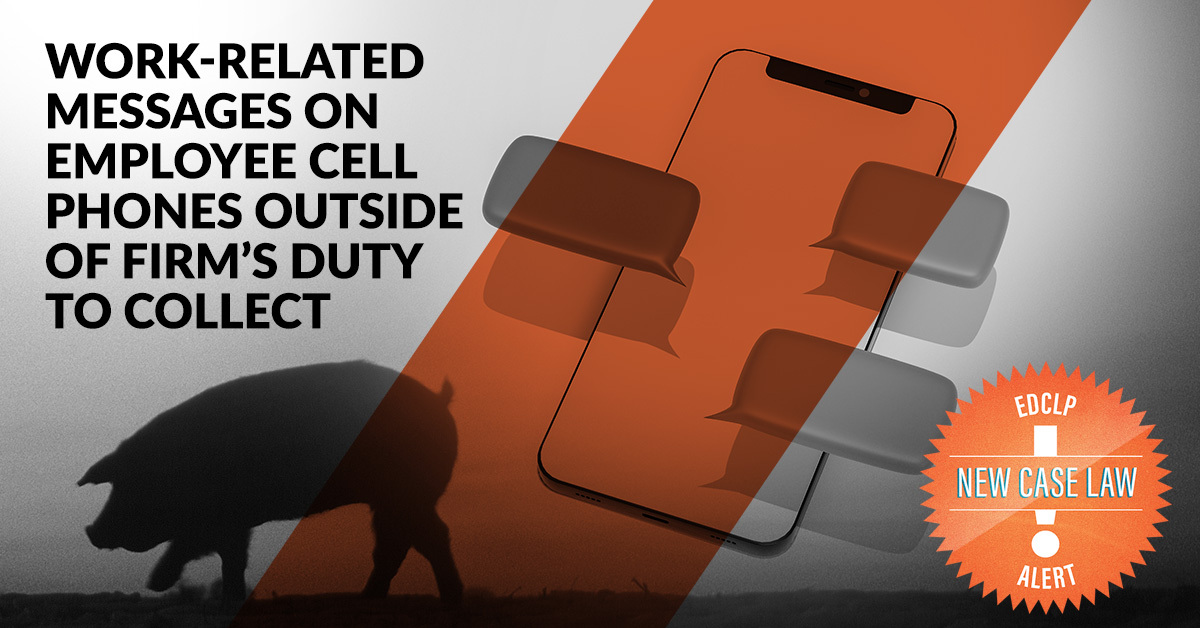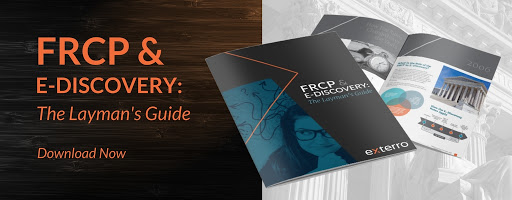E-Discovery
Case Law Alert: Work-Related Messages on Employee Cell Phones Outside of Firm’s Duty to Collect
August 12, 2022

While parties to a legal matter have an obligation to produce relevant ESI during discovery, there are limits to what production they can compel from third parties, including employees. In the matter In Re Pork Antitrust Legislation, the court found that a party, in this case a company, was not in “control” over its employees’ personal devices, even when used in connection with work-related activities, so did not have a duty to produce texts from those devices.
Overview
In this antitrust case, key players in the American pork industry are accused of price fixing for pork products. The plaintiffs moved for one of the defendants, Hormel Foods, to preserve personal cell phone data from multiple employees identified as custodians. Hormel objected on the grounds that it did not have possession, custody, or control of the personal cell phones or cell phone data of these employees, as confirmed by the company’s “Bring Your Own Device” (BYOD) policy.
When plaintiffs subpoenaed these custodians directly, the custodians responded that different personal cell phones were in use during the time period in question and that their personal cell phones were not used for work-related purposes aside from internal communications. Additionally, custodians alleged that the plaintiffs were unable to provide reasonable suspicion that relevant data would be produced, and that the searches would be “broad, burdensome, and costly.”
Due to the disagreement, the plaintiffs filed a motion to compel Hormel Foods and the cell phone custodians to search for and produce any relevant messages.
Ruling
- Motion to Compel Hormel Denied. Because the plaintiff was unable to adequately demonstrate that Hormel Foods had control over the custodians’ data or authority to access text messages, the judge denied the plaintiff’s motion to compel Hormel to produce the data from the custodians’ personal devices.
- Motion to Compel Custodians Granted. Since some custodians used their phones for work-related communication, the court determined that there was insufficient evidence that proper diligence was performed to ensure that relevant communication and data was not present on those custodians’ phones. To remedy that, it granted the request for forensic imaging of the custodians’ cell phones, limited to the time period that custodians held relevant positions within the scope of the case.
- Burden for Imaging is High. The court exercised discretion in determining that the reasonable costs associated with the forensic imaging should be split evenly between plaintiffs and Hormel because of the duty of a subpoenaing party to “avoid imposing undue burden or expense on the person subject to the subpoena” as established by Rule 45(d)(1), and because Hormel supported its employees use of their own devices for business purposes.

Expert Opinion from David Cohen, Esq., Chair – E-Discovery Group, Reed Smith LLP
This opinion discusses the competing “legal right” and “practical ability” tests for determining what data is within a litigation party’s “control.” The court concluded that, under either test, Hormel did not have control of its employees’ texts because the company’s BYOD policy gave it no right to access those texts.
Case Law Tip
Have questions on how the FRCP applies to e-discovery? Download this FRCP E-Discovery Quick Guide to get all your questions answered.
